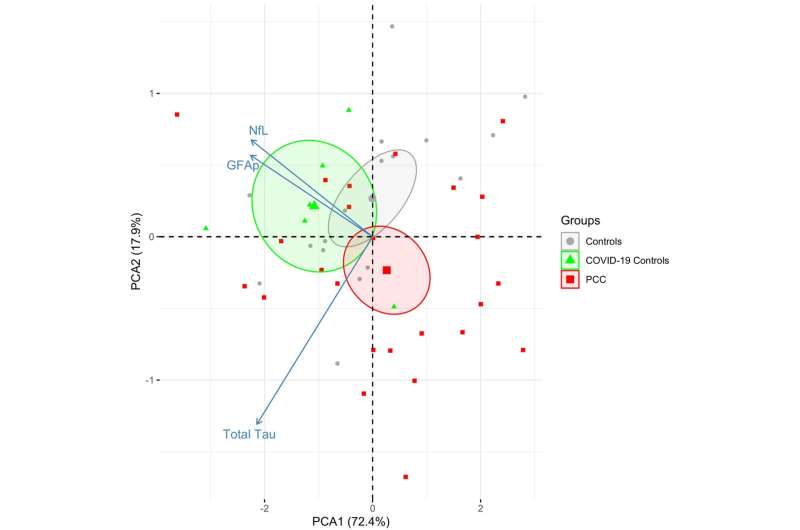This article has been reviewed according to Science X's editorial process and policies. Editors have highlighted the following attributes while ensuring the content's credibility:
fact-checked
peer-reviewed publication
trusted source
proofread
Post-COVID condition is not linked to ongoing infection or active brain damage, study shows

Post COVID-19 condition does not appear to be linked to direct viral invasion of the brain or active brain damage. This has been shown in a study by researchers at the University of Gothenburg. Searching for abnormal biomarkers among the participants yielded no hits in either blood or cerebrospinal fluid samples.
The condition that can follow the acute phase of COVID-19 infection, termed "Post-COVID condition," or "long-COVID" can persist for several months subsequent to the initial infection. The condition includes various combinations of fatigue, apathy, and difficulties with memory and concentration.
The current study, published in the Journal of Infectious Diseases, included 25 people with confirmed post-COVID condition, six people without residual symptoms after COVID-19, and 17 control subjects who were completely free of COVID-19.
The strength of the study lies not in the number of participants, which is fairly limited, but in the fact that they all—including the control subjects—underwent not only blood tests but also the considerably more invasive procedure of lumbar punctures to collect cerebrospinal fluid.
At the time when the samples were taken, at least three months had passed since the first symptoms of COVID-19 in those who had had the disease. The samples were taken between February and November 2021, and were analyzed for a total of 37 different biomarkers.
No differences between groups
Notably, the blood and cerebrospinal fluid analyses showed that SARS-CoV-2 antigens were undetectable in all samples. Additionally, there were no significant differences between the groups when analyzing blood and cerebrospinal fluid for immune activation or brain injury markers. The findings thus suggest that post-COVID condition is not the result of ongoing infection, immune activation, or brain damage.
The first author of the study is Nelly Kanberg, a doctoral student in infectious diseases at University of Gothenburg's Sahlgrenska Academy and a specialist doctor at Sahlgrenska University Hospital.
"The findings enhance our understanding of post-COVID condition," she says. "The results suggest that the condition is more likely a consequence of events that occur during the acute phase of COVID-19, rather than an ongoing viral infection or persistent inflammation of the central nervous system."
The extent to which post-COVID condition can be linked to the body's inflammatory response during the actual infection is unclear. Many studies are currently being carried out around the world, including those that explore risk factors for post-COVID condition.
The importance of long-term health and care
Nelly emphasizes the importance of continued research into the long-term impact of COVID-19 on neuropsychiatric health. She is backed up by Magnus Gisslén, professor of infectious diseases at Sahlgrenska Academy, who had main responsibility for the study.
"In order to improve the care and quality of life for those who experience long-term neurological symptoms after COVID-19, we need to understand the underlying causes of post-COVID condition," he adds. "This study provides new insights into the condition, and can thus represent a valuable contribution to ongoing discussions and research."
More information: Nelly Kanberg et al, COVID-19 Recovery: Consistent Absence of Cerebrospinal Fluid Biomarker Abnormalities in Patients With Neurocognitive Post-COVID Complications, The Journal of Infectious Diseases (2023). DOI: 10.1093/infdis/jiad395




















